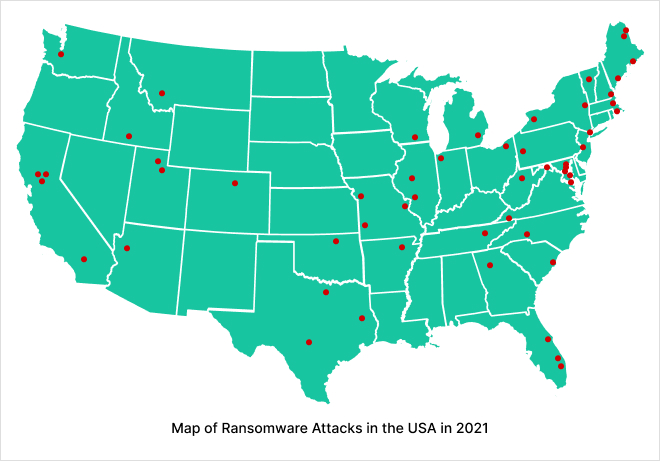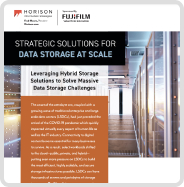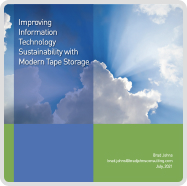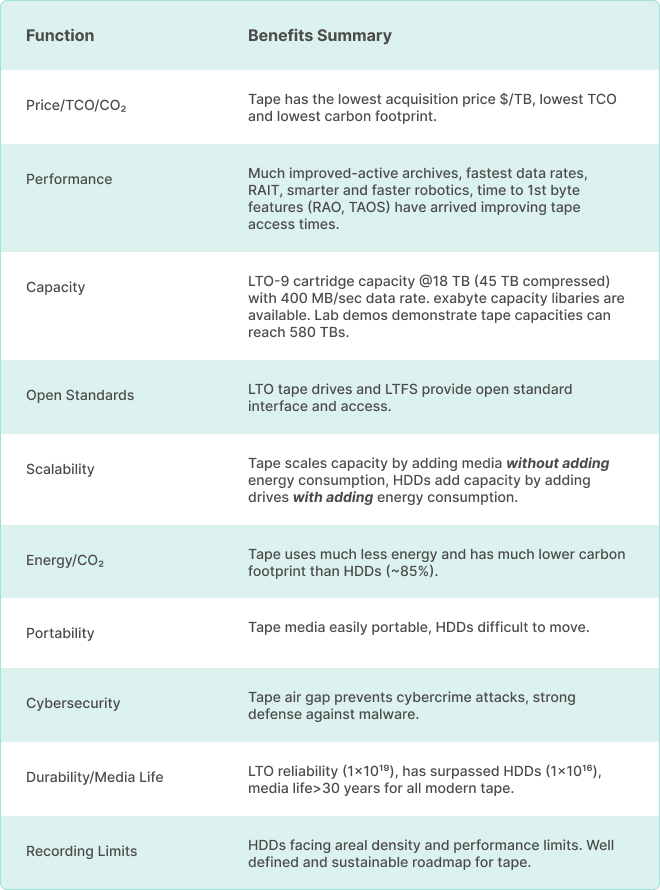FUJIFILM tape technology helps large organizations strategically manage data efficiently while attending to important concerns like security, carbon footprints and budget. The high capacity and low cost of tape position it as the premium storage option for solving massive data storage challenges.
Find out how much money your company is losing by not storing cold data on tape. Use the calculator tool below to estimate the difference.
See How Much You Are Losing By Not Storing Cold Data On Tape
Select your storage format
Select your current amount of cold data stored on HDD
Want to find out more about how we can help you reduce cost?
Modern tape lets you keep data on premises or off, integrate cost-efficiency options alongside cloud data solutions, create redundancies critical to disaster recovery, and control assets to support compliance with the unique regulatory requirements of your industry. All of these benefits come at a price point much lower than those tied to technology alternatives.
Magnetic tapes are palm-sized cartridges that can read and write data to tape. One tape can hold a large amount of data. FUJIFILM's LTO Ultrium 9 cartridge, for example, can hold 45 TB of compressed data or 18 TB of uncompressed data. To understand how much data that really is, consider this: 45 TB is equivalent to the data housed on 720 iPhones with a 64 GB capacity.
Tape can be used by organizations of all sizes for archival data storage. But large scale data centers, cloud providers and large corporations can rely on it for data management at scale — archiving and protecting extreme amounts of data that might be required for future endeavors or tasks.
How Google Backs Up the Internet
Typically, organizations use tape to archive cold data. This is data that doesn't need to be accessed, edited or overwritten in the normal course of business and must simply be saved for the future. The set-it-and-forget-it nature of tape lets organizations amass enormous banks of data as needed while expending minimal resources.
You could be wasting money every day if you store cold data on a hard disk or in the cloud. HDD storage solutions are great for holding information you need to access on a regular basis. But once the data goes cold, why keep it on a spinning disk 24/7? Cold data sitting in the cloud means you'll pay for storage and accessibility at a much higher price than on-premises tape systems.
Find out how much you can save by leveraging tape for cold data. Use the calculator tool to estimate savings.
See How Much You Are Losing By Not Storing Cold Data On Tape
Ransomware attacks are on the rise. According to Statista, 2023 saw approximately 73% of businesses victimized by ransomware attacks — an uptick of about 2% compared to 2022.
Stop Ransomware. Secure Your Data with a Tape Air Gap.

Your data is growing at an exponential rate. You can choose to scale up your expensive on-premises or cloud solution. Or you can turn to tape, offloading cold data into safe, accessible storage to free up your other resources and make active data more manageable for systems and teams.

Learn how leveraging hybrid storage solutions can help solve massive data storage challenges.
Learn more about Hybrid Storage SolutionsTraditional drive-based, on-premises solutions take resources — a lot of them. Every day you hold archival data in these formats, you're needlessly increasing your carbon footprint — an important consideration for large corporations and other organizations that may need to keep ESG factors and compliance in mind. Moving sensitive cold data to tape storage helps increase sustainability and reduce carbon footprint.

Discover tape’s role in trimming the environmental impact of data storage in this whitepaper from Brad Johns Consulting
Learn More about Sustainable Tape StorageWe recently hosted a virtual roundtable discussion entitled, “Is Tape Really Eco-Friendly?” with two end-users, Jason Adrian from Microsoft Azure and Vladimir Bahyl from CERN. TCO and energy consumption expert Brad Johns and Shawn Brume from IBM joined the discussion to share their observations and perspectives.
Is Tape Really Eco Friendly? - A Virtual Roundtable Event Presented by Fujifilm
While tape is tried-and-true technology, FUJIFILM and its partners have worked over the years to create an ever-evolving solution to meet growing archival data needs. It's a new game with new rules today.
Check out why Microsoft chose tape.
Why Microsoft Chose Tape
Modern tape solutions easily dispel common concerns with this format:

Tape media has been proven to be a highly secure, cost-effective, and sustainable data storage solution. In order to learn more, download the whitepaper below entitled Tape. New Game. New Rules.

Modern tape technology advancements are accelerating along with the digital transformation as we have now entered the era of zettabyte scale storage demand on an annual basis.
Learn Why you Should Choose Tape MediaGet in touch with one of our sales reps today to learn more.


